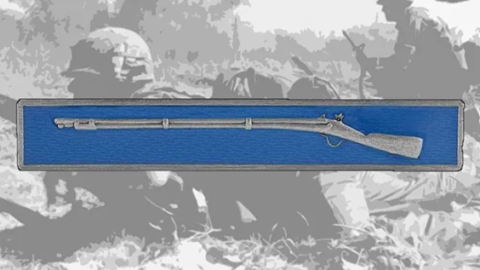Chris Bray on a recent article in which a USAF Colonel lectures other “white colonels” about institutional racism in America’s military services:
Thoughts about the Air Force colonel who delivers sanctimonious lectures about institutional racism to his fellow “white colonels”.
In you’re an infantry soldier in the US Army, you can distinguish yourself by earning an Expert Infantry Badge. To do that, you have to qualify as an expert with the rifle, then complete a series of skills tests like “set headspace and timing on a caliber .50 machine gun” and “operate as a station in a radio net with SINCGARS radio single channel”. Then, finally, you have to complete a 12-mile road march. You can read the standards for that event here: carry a rifle and magazines, wear a helmet at all times, carry a rucksack weighing at least 35 pounds, and so on. When the person with the stopwatch says that three hours have elapsed, you’re either standing behind the finish line or in front of it; you either earn the EIB or you don’t.
The test isn’t subjective — the judges don’t award you style points. If you crawl across the finish line in a pool of blood and urine, sobbing for mommy, but you do it in less than three hours, and you still have your rucksack and your rifle and everything else at the end, you get the EIB.
Nor is it weighted. If you’re a fourth-generation VMI graduate with a fine old family name that can be found on the rolls of the Mayflower Society, you get the EIB if you cross the finish line on time. If you’re an E-2 who grew up in a trailer park and barely made it out of high school and doesn’t remember the names of all your so-called stepdads, you get the EIB if you cross the finish line on time. Officers and enlisted work to exactly the same standard. The credential comes from the task, full stop. This fact is the core of every credential you can earn in the military: If you’re authorized to wear the Parachutist Badge, you went to Fort Benning, or whatever they call it now, and jumped out of the plane five times without missing the ground. You did the thing. Doing the thing is who you are, in a growing list of things.
As a set of organizations built on task competence, for plainly measurable tasks that can’t be faked or fudged, the armed forces have been America’s first meritocracy. The first black West Point graduate was commissioned in 1877; the first black Medal of Honor recipient was born into slavery. Even in the segregated military, credentials obtained through task competence bore weight, as the court-martial of Jackie Robinson suggests with its outcome: In 1944, in Texas, a black officer was correct to harshly demand respect from a white enlisted soldier.
If you’ve served in the military, you’ve seen this. In my first posting as an infantryman, my company commander, first sergeant, platoon sergeant, and squad leader were black, a fact that I never heard anyone even mention. Rank, profession, and authority come from doing, without socioeconomic or racial chutes or ladders: If you can fly the plane, you’re a pilot. Up to the boundaries of the flag ranks, politics and identity don’t matter. (Regarding those flag ranks, see the late David Hackworth’s discussion of “perfumed princes”.)
And so the descent of the American military into the performative politics of DEI and equity and Robin DiAngelo books just blindly shits on the core value of the American military, which is that you get the rank and the status for what you do, full stop.





While I agree a lot of the “institutionalized racism” claims are BS, in fact the military is far from a pure merit-driven organization. Promotions and assignments are intensely politics driven–and the higher up the ladder you go, the more this is so. Same for awards (e.g. medals), school/training slots, etc.
EIB is a good example of a purely standards-driven award, all other things being equal. However, in practice, some folks (those who are under protection and patronage) can be “pencil-whipped” into qualifying. And of course, one must be awarded the opportunity to participate in the EIB trials–which is not always as signing up and showing up at the trials.
If you submit an award recommendation for a soldier–and said soldier is not above a certain rank, or connected to the patronage network, the recommendation–if approved–will almost certainly be downgraded. For example, the recommendation is for an ARCOM and it is downgraded to an AAM. You submit for an AAM, and it is downgraded to maybe a certificate and a handshake from the BN CDR.
OTOH, if someone is the “proper” rank, they get certain awards handed out like candy.
Some of this is service-wide, but there’s certainly some unit-to-unit variation.
Comment by Mike Ruff — November 5, 2023 @ 12:22
I don’t have any inside information about the US military, but some of what you say was observably true of the Canadian army in the 1970s, so I’m quite willing to believe you on this. Favouritism has always and will always feature in any organization, and the better ones limit its effects as much as possible.
Comment by Nicholas — November 5, 2023 @ 18:38
Merit is RACIST!!! Full stop.
Comment by MBlanc46 — November 5, 2023 @ 18:25